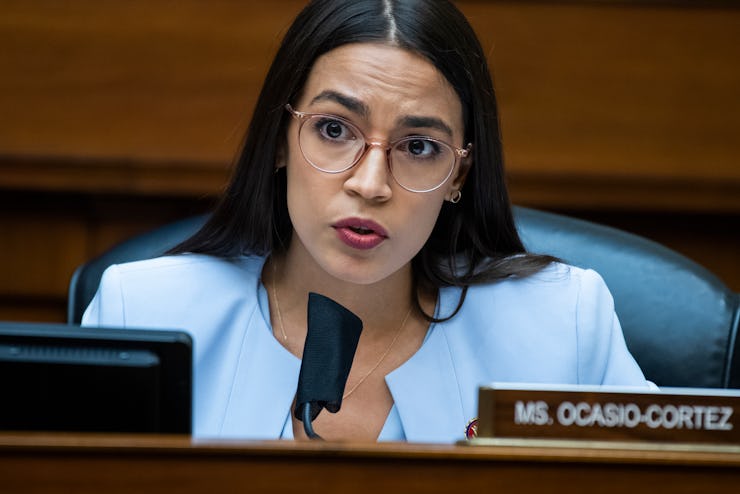Why AOC is an advocate for psychedelic drug research
This is the second time the Congresswoman has proposed removing research barriers.

For the second time, Representative Alexandria Ocasio-Cortez is proposing legislation that would remove barriers to federal research on the therapeutic potential of psychedelics like MDMA and psilocybin.
Despite a plethora of non-federally funded research confirming the efficacy of psychedelics in treating conditions like PTSD and depression, these drugs remain Schedule 1 substances. This classification designates substances as having “no medical value.” Federally funded research into the therapeutic uses of these substances is largely prohibited.
Ocasio-Cortez’s proposal would remove those barriers, allowing further study into therapeutics advocates and scientists say offer hope as a treatment for persistent mental health challenges.
What’s new — In announcing the proposed amendment Thursday, Ocasio-Cortez tweeted:
A tweet from Ocasio-Cortez.
Part two of Ocasio-Cortez’s message.
The Congresswoman from New York’s 14th congressional district is hoping to overturn language that’s been attached to legislation funding the U.S. Departments of Labor, Health and Human Services, and Education since 1996. This rider prohibits the use of federal funds for “any activity that promotes the legalization of any drug or other substance in Schedule I.”
While there has been some political will for overturning Schedule 1 research barriers in relation to cannabis, at the federal level, few politicians are willing to discuss widespread changes to legislation regarding psychedelics. Ocasio-Cortez’s proposed amendment is notable because it specifically points to the therapeutic value of these substances.
The amendment strikes the prohibition of the use of funds to be used for activity in relation to Schedule 1 substances. This, in turn, would allow researchers to request financial support to study drugs already shown to be effective in treating conditions, like ibogaine and LSD. The National Institutes of Health is the world’s largest public funder of medical research.
If approved, the U.S. government wouldn’t be the first at the party. Australia, for example, has already approved a bill funding research into the therapeutic uses of psychedelics.
Why is Ocasio-Cortez introducing psychedelics legislation now?
Ocasio-Cortez’s latest amendment is attached to a bill that would fund multiple agencies. The Congresswoman’s office didn’t respond to Inverse about her rationale for introducing the amendment now, but there are a few likely factors:
- Oregon and California have been dipping their toes into permitting the use of psilocybin, the active ingredient in magic mushrooms. Oregon is the first state to actually approve the use of mushrooms in a therapeutic setting, and California’s proposed SB519 would decriminalize the possession and non-commercial sharing of psychedelics by people 21 years of age and older. Over the past several years, dozens of studies have confirmed the efficacy of these drugs in treating addiction, PTSD, and treatment-resistant depression.
- The U.S. House Committee on Appropriations pushed for the research barriers on psychedelics to be lifted for veterans, a demographic that has high rates of PTSD and addiction. A similar bill was just passed in Texas.
- The “psychedelic renaissance” now includes mainstream advocates like Michael Pollan, who has now written two books about psychedelics. This may make the legislation more palatable to certain lawmakers.
Ultimately, however, Ocasio-Cortez seems dedicated to this cause, regardless of the political winds.
Ocasio-Cortez proposed similar legislation in the House of Representatives in December 2019, where it met a resounding defeat. Only 22 percent of the House voted to approve the amendment: seven Republicans and 84 Democrats.
Psychedelics and research barriers
What would happen if the research barriers on psychedelics were overturned?
It would be the first possible step towards a reclassification of the substances. The Catch-22 of Schedule 1 substances is that they’re designated as having no accepted medical use, which means the researchers’ ability to study the medical uses of the substances is severely limited. It’s functionally saying we don’t see any medical use for this substance, and researchers aren’t allowed to look for any.
Harvested “magic mushrooms” on display in Colorado.
If federal regulators could be convinced of the medical use of substances that are currently classified as Schedule 1, the “no medical use” standard would no longer apply, and substances could be reclassified.
For now, most psychedelic research is funded by private foundations, wealthy donors, and venture capital.
The Inverse analysis — It seems unlikely that an amendment on a subject as politically controversial would go from 22 percent support to a Filibuster-proof majority of 60 percent — and there’s no indication that President Biden would ultimately approve it — but that’s somewhat beside the point.
Controversial federal legislation needs public pressure and politicians at the federal level to champion it. Ocasio-Cortez is one of the most high-profile people in Congress. Sustained pushes from legislators like Ocasio-Cortez are an essential part of moving the issue forward and hopefully getting Congress and the President to a place where the amendment can pass and become law.